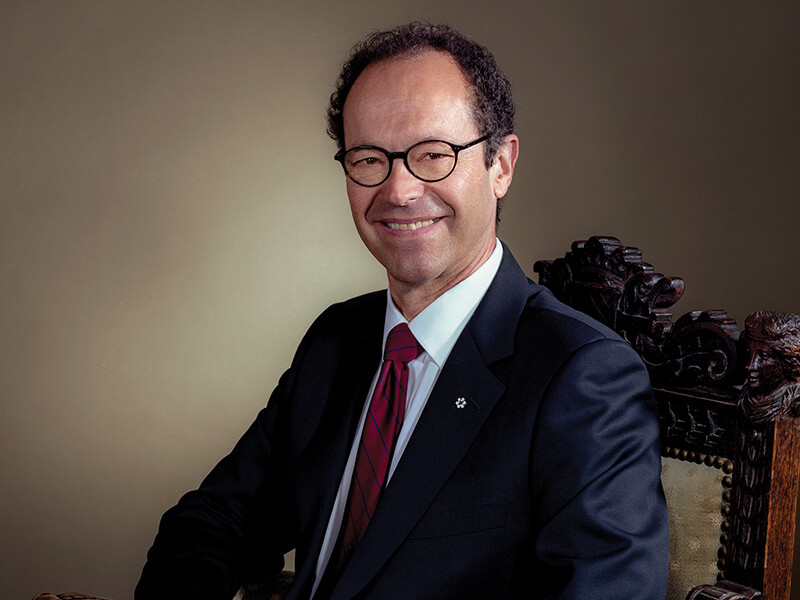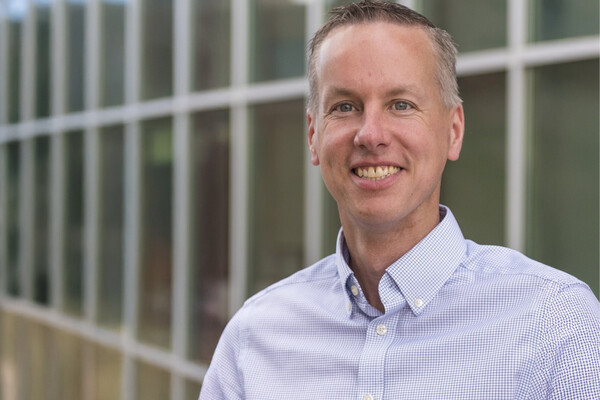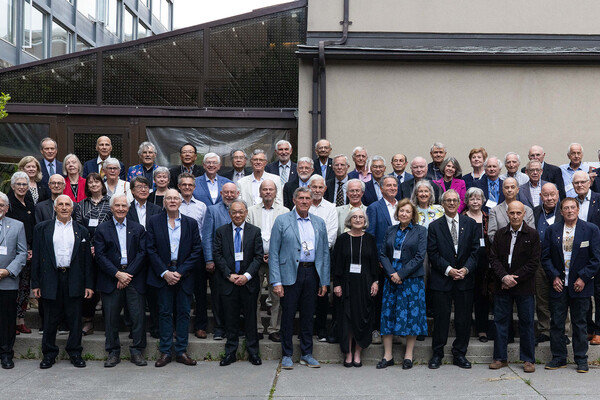Main Second Level Navigation
Breadcrumbs
- Home
- News & Events
- Recent News
- Celebrating a Canadian health care icon: Dr. Michael A. Baker MD Award
Celebrating a Canadian health care icon: Dr. Michael A. Baker MD Award

Michael A. Baker (MD ’66) is not one to be easily rendered speechless. But, when Rose Patten, his longtime patient and the University of Toronto’s chancellor, revealed her intention to establish and name a new endowed award in support of MD students in the Temerty Faculty of Medicine in his honour, Baker found himself momentarily overwhelmed.
“When Rose told me of her plans for this gift and this award, I was thrilled to the point of tears,” explains Baker, a professor of medicine at U of T and a senior consultant at University Health Network (UHN).
Reflecting on his own modest background, Baker shared, "My parents were immigrant factory workers, and I could barely afford tuition myself back in my day. I fully understand the incredible value of helping MD learners get through our training and education program, and I can’t think of a more noble cause. I was honoured and grateful."
Patten's desire to recognize Baker was rooted not only in the exceptional care he provided her but also in his far-reaching contributions to medical science and the broader Canadian health care sector.
“Dr. Baker is an extraordinary physician whose commitment to his patients shines through in every interaction you have with him,” says Patten. “He’s had a tremendous impact on me and on countless others over the years — both directly, as a clinician, but also through his brilliant research and long history of leadership within the health care system.”
“This award honours all he has done for me and the many more who have been touched by his work. It’s a way of saying ‘thank you’ while also paying it forward to a new generation of doctors who will follow in his footsteps.”
Early Days: From Child Performer to a Fateful Summer
Even those who know Baker well may be surprised to learn medicine was, in fact, his second calling.
“When I was eight years old, my drama teacher put me forward for an audition to act on a nationally-syndicated radio soap opera show called Aunt Lucy’s Storytime,” says Baker, who went on to act professionally in radio and television for a decade.
But, acting jobs began to dry up as he matured — leading Baker to plan career change. His cousin, Ben, had become a doctor and was the hero of their extended immigrant, working class family. Baker decided he wanted to share some of Ben’s familial star power by also pursuing medicine — even going so far as planning to follow his cousin into psychiatry.
But, after choosing every elective and selective offered in the field during his first year of medical school at the University of Toronto, Baker quickly realized psychiatry wasn’t the right fit. He was left still searching for direction, until a fateful summer job changed his life forever.
During his second year of medical school, he was offered a summer studentship via the Medical Research Council, now the Canadian Institute for Health Research (CIHR), to work with Donald Cowan, a new faculty member based in Toronto General Hospital’s hematology division.
“I knew nothing about hematology but was drawn to Cowan. I wanted to be just like him. He and the hematology team, including division head, John Crookston, basically adopted me. That started my career.”
Baker was put to work in Cowan’s lab, supporting projects examining leukemia at a cellular level. At the time, as Baker explains, a diagnosis with leukemia was essentially a death sentence for patients.
“Back then, we didn’t even tell people they had the disease, it was so horrifying,” says Baker. “But this team had hope. I was so excited to be working in a field that was new and exciting that others had considered hopeless.”
Clinician, Scientist and Hospital and Health Care Leader
Baker pursued specialist training in internal medicine and hematology at New York’s Mount Sinai School of Medicine. He then returned to Canada in 1972 to take up a post at Toronto Western Hospital, pursuing hematology research and clinical trials.
He would later go on to lead U of T’s division of hematology, build the leukemia program at Toronto General Hospital and, ultimately, serve as physician-in-chief of the University Health Network for nearly two decades — all while also leading important scientific investigations that have helped improve understanding of human leukemia and other cancers, and contributed to significantly improved patient outcomes.
“The field has advanced slowly, but consistently, one step at a time,” says Baker, a member of both the Order of Canada and the Order of Ontario. “The form of leukemia I worked on most of my life, acute myeloid leukemia, used to be known as the world’s worst disease. Survival timelines would be in weeks. But with many people in labs and clinics all over the world working on the disease, we made progress. And after hundreds and hundreds of contributions, we’re now in a place where we can offer hope.”
His contributions to his field and the broader medical sector also included terms as president of the National Cancer Institute of Canada, as a board member of the Canadian Cancer Society and as chair of the Institute of Evaluative Sciences. In 2008, he was appointed by the Ontario Ministry of Health and Long-Term Care as Executive Lead - Patient Safety, to oversee the government's patient safety agenda.
Somewhat unusually, he made a point of maintaining an active clinical practice at every stage of his career.
“I've always been most proud and most dedicated to patient care, to understanding people's problems and interacting with their them and their families,” says Baker. “It’s had a profound impact on me, from my early training days to the present time.”
“Even when I was physician-in-chief at UHN, I had a clinic and practice of medicine. I did it because I enjoyed it and it was central to who I am, but it was also strategic. Leaders are still people who can show up on the factory floor. It never failed to give me credibility with my colleagues.”
Advice to the Next Generation
Today, Baker is a highly-sought mentor to trainees and early-career health professionals. While he recognizes the challenging nature of the dual focused clinician-scientist career path he chose to pursue, he continues to encourage medical learners to consider its many benefits.
“The cliche of bringing the lab bench to the bedside and the bedside to the bench is not just a metaphor. It's extremely real,” he says. “Some of the most amazing basic science discoveries have been made by people with clinical skills and clinical practices, and some of the most heartfelt and warm and caring clinical practices are people who have PhDs and come out of the laboratory.”
“It’s definitely challenging. It takes many more years to train and you have to walk that line between the so-called ‘real’ scientists and the ‘real’ clinicians. But I strongly encourage people to go the clinician-scientist route if they can.”
He also reflects on the importance of remembering the powerful role medical professionals can play in patients’ lives — even at the most emotionally challenging or seemingly hopeless times.
“When I was training in New York, my first ever hematology rotation was in a children's leukemia ward — and I almost quit right then and there,” says Baker. “But I was counselled and mentored and I came to understand that, as a physician, it’s never my fault a patient is sick. But I do have the ability and training to help them as much as I possibly can.”
“Oncologists and cancer doctors everywhere understand that we serve for the most noble, possible reason: to help people, even when hope may seem lost. It turns out, paradoxically, to be a wonderful, fulfilling feeling that has always inspired me to push on.”
Make a Gift
News


